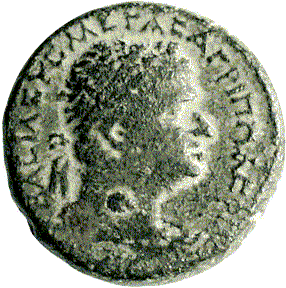Given name: Marcus
Julius Agrippa
Last Jewish monarch to rule all of Palestine. Named for
Augustus'
closest friend, Marcus
Agrippa, the oldest of Herod's
Hasmonean
grandsons was taken to Rome
by his widowed mother soon after Herod's death (4
BCE). Impoverished
by lavish living, Agrippa returned to Palestine where his
brother-in-law, Antipas,
made him administrator of the market in the Galilean capitol, Tiberias
(29
CE?).
Soon dismissed after a quarrel with his patron, Agrippa
spent several years searching for patronage from non-relatives
including, Flaccus, the
new governor of Syria. Only
after he returned to Rome (36 CE) did he find it, as protégé of
Augustus' grandson, Gaius
(Caligula). So effusive was
he in his flattery of his Roman patron that he made the political
mistake of publicly wishing that Gaius were emperor instead of his
uncle, Tiberius.
Tiberius had him imprisoned, but Gaius freed him as soon as he
became emperor only months later (37 CE). To reward Agrippa's
loyalty, Gaius gave him control of the provinces formerly
administered by Agrippa's half-uncle, Philip,
as well as other provinces in Syria & awarded him the title of
"king" [basileus], which had not been officially
bestowed on any member of his family since the death of Herod
"the Great" (4 BCE). This sudden rise of a social vagabond
to the heights of political glory made Agrippa's sister [Herodias]
& brother-in-law [Antipas] so jealous that they dared petition
the emperor for royal rank for themselves. Instead, Gaius banished
them & added their provinces [Galilee
& Perea]
to Agrippa's kingdom (39 CE).
The murder of Gaius (41 CE) did not
end Agrippa's fortunes, since he quickly became a supporter of his
old friend, Claudius,
the new emperor. Claudius rewarded
him by giving him control of the provinces of Judea
& Samaria.
Thus, for four years the extent of Agrippa's kingdom rivaled the
extent of his grandfather's. His lavish building projects &
grants to supporters, however, exceeded his revenues. Though
scrupulous in his public observance of Jewish ritual in
Jerusalem,
his life-style elsewhere was thoroughly Romanized. He died at Caesarea
Maritima shortly after being
stricken while conducting a celebration of the Roman imperial cult
in which the crowds, dazzled by his silver garments, proclaimed him
a god.
References:
Josephus,
Antiquities
18.129-204,
228-255,
289-301;
19.236-245,
265,
274-279,
292-316,
328-352.
_____, War
1.552;
2.178-183,
206-223.
Philo, Flaccus
55-56.
Other resources on line:
![]()
![]()

![]()
![]()
![]() Perspective on the World of Jesus
Perspective on the World of Jesus ![]()